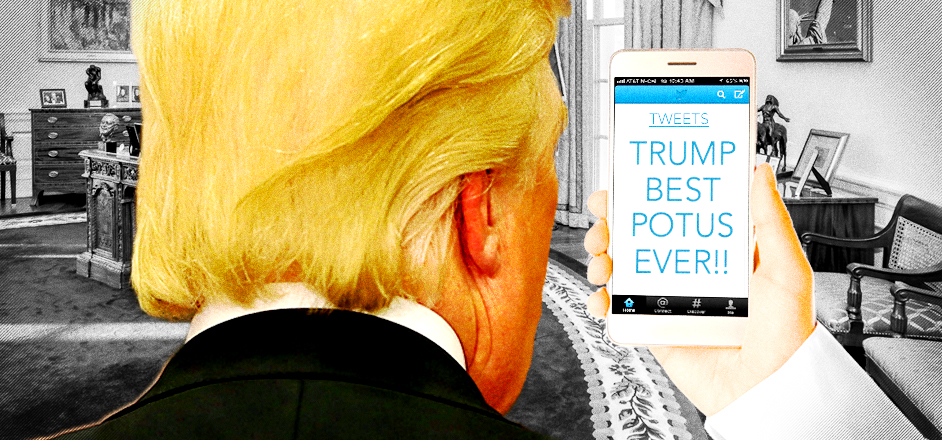Late at night or early in the morning, before Donald Trump pushes a small blue "Tweet" button on his phone, he sees what all of us see: a stream of tweets from the people he follows. That's one of his personally chosen views of the world. And, what we've found, an important one, too.
Because we can't see what Trump watches on TV. But we can know exactly what he sees on Twitter. He only follows 45 people, most of them family, ardent supporters, White House staff members and the CEO of World Wrestling Entertainment. For two weeks, we followed who he followed, read who he read — what's most remarkable, is after 14 days of watching, it isn't what he sees that's a problem, it's what he doesn't see.
President Trump doesn't get much news from actual outlets on Twitter — either local, national of international. There are no tweets from other politicians. Memes. Jokes. Sports. Pop culture. Science. Movie or music news. Literature. Comedians. There's no serious journalism in his feed, not even conservative journalism (aside from the Drudge Report). No National Review, no Federalist, no Reason — no Wall Street Journal. Remarkably, for a businessman, there isn't even any business news.
What does he see? Himself. Trump follows Trump.
Of the 45 accounts he follows, nine aren't people; they're businesses controlled by Trump, mostly golf courses and hotels. Of the other accounts, seven are family members. Nine work for him.
Aside from a few friends who don't tweet much, the posts in Trump's feed come from an amazingly narrow group of people — about 10 people overall, all TV personalities. In rough order, the most visible figures are Sean Hannity, Greta van Susteran, Eric Bolling, Piers Morgan, Ann Coulter, Laura Ingraham, Tucker Carlson, Jesse Watters and Bill O'Reilly — who are all hosts, former hosts, or frequent guests on Fox News. Trump, who made his name and some of his fortune on TV, has a twitter feed that is essentially Fox News in 140 character packets.
And their tweets are largely their own opinions about Trump, positive opinions. Trump's decisions are right, his moves brilliant, his family beautiful.
No one on his feed skewers his agenda, or thinks he's doing a bad job, or even points out his missteps — this in a country where 54 percent of people disapprove of the job he's doing as president, according to the Real Clear Politics polling average.
Which isn't so unlike everyone else. Twitter feeds are designed to tell us our friends are awesome and the political party we've chosen is correct. Rigorous analyses support this sense that social media promotes a self-affirming frame of mind. In an influential paper put out last year, social scientists "offered quantitative evidence" that "echo chambers exist on social media." Users "promote their favored narratives" and "assimilate only confirming claims and to ignore apparent refutations."
It's just that, like so many things about Trump — from his gold-plated properties to his supermodel wife — Trump is to the extreme; his Twitter feed is so much more all about him. How strange to have all your friends tweet about you, so much of the time. How strange to have it all be so positive.
No matter what was happening in the world over the past two weeks — whether an Earth-shattering Senate testimony or a madman shooting at congress members — the narrative was the same, it's just the particulars that were different: Trump is correct, noble, good. Everyone else is wrong, bad, sneaky.
To pick just one example, the Senate hearings with Comey and Jeff Sessions were covered hugely by The Washington Post and The New York Times, with headlines such as "Comey calls Trump a Liar" and "Sessions denies collusion with Russia." But on Trump's Twitter feed, the Russia investigation is due to "Russophobia" (Ann Coulter), the Comey testimony was "the deep state out for revenge" (Sean Hannity) and the Sessions hearing was "the Seinfeld of hearings — a hearing about nothing" (Donald Trump Jr.).
Rarely, someone interrupts the narrative. Greta van Susteran tweeted about Antarctica melting. Geraldo Rivera called the Benghazi investigations "pompous baloney." But these sour notes — if you blink, you'll miss them.
Also, it's so thin. Most people's Twitter feeds pour down the screen like a waterfall. Trump's, on the other hand, is a trickle. Often, there are just 25 tweets an hour. Sometimes just eight or 10. You can skim today's happenings in less than a minute. And it's so heavily full of opinion, there isn't much sense of the world.
You can tell that his Twitter feed is where he learns about the world, because many or most of his re-tweets come straight off this feed.
All of this matters. This tendency, for everyone's Twitter feeds to confirm what we already believe, another paper found, "comes at the expense of the quality of the information." In Trump's case, we have elected, it seems, a low-information voter.
You’d think a country's president would want solid facts from many different corners, and the occasional challenge to his way of thinking. But if Trump is getting that anywhere, it's not coming from his Twitter feed, where the entire world is coming up Trump.



Leave a Reply